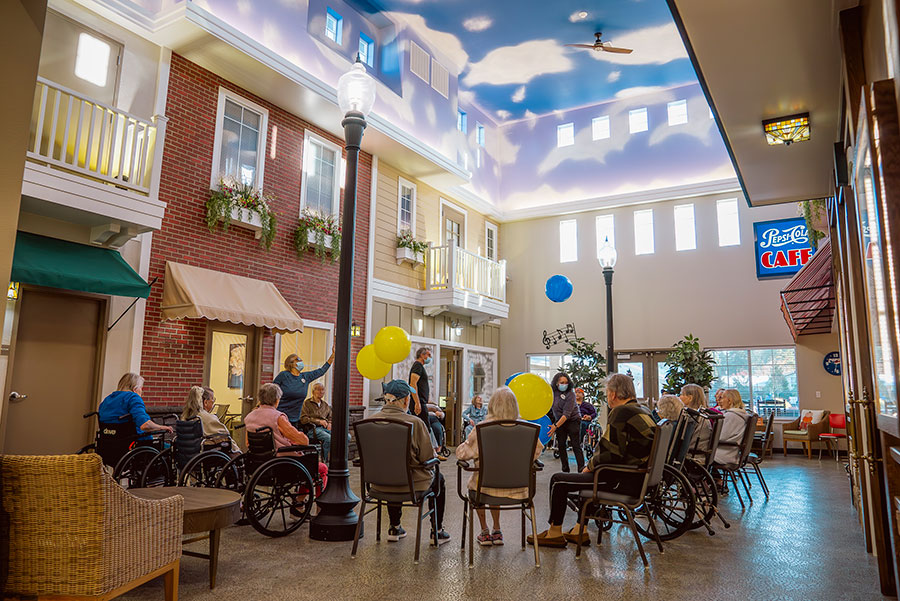Find Small Memory Carehomes Charlotte Families Trust
All About Memory Care Providers: Why Tiny Memory Treatment Homes Are a Wonderful Choice
Memory treatment solutions play a necessary function in supporting people with Alzheimer's and dementia. Tiny memory care homes stand apart for their customized approach and intimate setup. With lower staff-to-resident proportions, these homes promote stronger connections and customized treatment. Homeowners take advantage of improved social interactions and a safe atmosphere. As family members discover alternatives, recognizing the one-of-a-kind advantages of tiny memory treatment homes comes to be essential. What aspects should be taken into consideration when choosing the appropriate home?
Comprehending Memory Care Solutions
While numerous might recognize with general senior care options, recognizing memory treatment services is necessary for households facing the difficulties of cognitive decline. Memory treatment especially caters to people with conditions such as Alzheimer's condition and other types of dementia. These solutions offer an organized environment that concentrates on boosting the quality of life for citizens via specialized treatment and support.Memory care centers are designed to assure safety and protection, frequently featuring secured environments to stop roaming. Educated team member are offered all the time to aid with daily activities, drug management, and personal treatment. Furthermore, memory care programs commonly include cognitive stimulation activities, customized to involve homeowners and promote mental health. Families can gain from comprehending these solutions, as they allow informed choices regarding their enjoyed ones' care, making certain that their specific needs and choices are attended to in a supportive and compassionate fashion.
The Benefits of Little Memory Care Homes
Small memory treatment homes supply distinct advantages that can considerably improve the high quality of life for citizens with cognitive disabilities. One considerable benefit is the intimate environment, which enables for personalized communications amongst personnel and locals. This smaller setting cultivates purposeful relationships, reducing sensations of isolation and anxiety frequently experienced by people with memory issues.Additionally, the lower staff-to-resident ratio in tiny memory care homes enables caretakers to supply more attentive guidance and support. This method not just boosts security however also advertises a sense of security for the residents.Moreover, tiny memory treatment homes can adapt promptly to the unique demands and preferences of each homeowner, permitting a more homey atmosphere. Such a setting can motivate social involvement and participation in activities, eventually improving the day-to-day experiences of those living with cognitive problems.
Personalized Treatment Program for Residents
Personalized care strategies are vital in memory care homes, as they accommodate the unique demands and choices of each local. These strategies begin with comprehensive analyses conducted by skilled experts, that examine cognitive capacities, case history, and personal passions. This customized method guarantees that care is not just efficient yet also respectful of each person's dignity and autonomy.Moreover, personalized care plans are versatile, permitting changes as homeowners' demands develop gradually. This flexibility cultivates a feeling of safety and security and experience, which is essential for individuals dealing with memory difficulties. Caretakers are educated to apply these plans constantly, supplying assistance that lines up with the homeowners' routines and preferences.Ultimately, individualized care strategies enhance the lifestyle for homeowners by promoting self-reliance, well-being, and interaction, making them a basic facet of memory treatment services in small memory care homes.
Creating a Home-Like Environment
Creating a home-like atmosphere is vital for fostering convenience and experience in memory treatment setups, as it substantially affects residents' emotional well-being. Little memory treatment homes commonly prioritize tailored touches, such as warm shade palettes, household photos, and familiar furnishings arrangements, which aid locals really feel more at convenience. Incorporating components reminiscent of a traditional home, like cozy home and public areas, motivates a feeling of belonging.Moreover, utilizing all-natural light and exterior spaces can boost the atmosphere, promoting leisure and serenity. Personnel play a considerable duty in preserving this setting by involving with citizens in a caring way, treating them like family. Routine activities, such as cooking or horticulture, can also add to a home-like feel, using possibilities for locals to join significant experiences. Overall, producing a supporting atmosphere supports cognitive function and psychological security, making it a vital aspect of memory care services.
Enhanced Social Interaction and Area
Boosted social communication and area are crucial components of memory treatment services. By fostering personalized social engagement and producing a family-like ambience, these solutions advertise purposeful links amongst citizens. Group occasions and tasks better urge involvement, helping individuals really feel a lot more included and supported.
Personalized Social Interaction
While social interaction is essential for total health, lots of individuals with memory disabilities typically have a hard time to engage meaningfully websites with others. Individualized social involvement in memory care homes addresses this challenge by creating customized tasks that accommodate locals' distinct interests and capabilities. By focusing on private preferences, caregivers can promote links that resonate deeply with everyone. Activities such as art therapy, songs sessions, and directed discussions promote cognitive excitement and psychological expression. Additionally, tiny group settings urge sociability and enable more intimate communications, improving feelings of belonging. This strategy not just battles feelings of isolation however likewise empowers homeowners to preserve a feeling of identity, inevitably contributing to boosted mental health and wellness and quality of life.
Family-like Ambience
In a memory care setting, cultivating a family-like atmosphere substantially boosts social interaction and constructs a sense of neighborhood amongst locals. Smaller sized memory care homes often focus on intimate environments, enabling residents to create closer links with one another and team member. This nurturing atmosphere advertises trust, which is crucial for individuals with memory impairments. Homeowners are more probable to talk and share experiences, producing a helpful network that eases sensations of loneliness. The familiarity of shared areas and regimens contributes to a sense of belonging, even more motivating social interaction (personalized memory care). In such settings, psychological bonds grow, leading to enhanced total health and a better of life for residents as they navigate their daily experiences together
Group Activities and Events

Safety And Security and Safety Attributes in Small Homes
Many small homes made for memory treatment integrate necessary security and safety and security features to guarantee the well-being of residents. These homes usually use safe and secure entrance and exit indicate protect against straying, a common concern amongst people with memory impairments. In addition, monitoring systems and alarm system systems boost tracking, guaranteeing that team can promptly reply to any uncommon activities.Interior layouts are tailored for safety and security, with reduced risks such as sharp corners and clutter-free pathways. Handrails and non-slip flooring are typically set up to reduce the risk of drops. Employee are trained in emergency procedures, ensuring they are prepared for different situations.Moreover, personalized treatment strategies might include evaluation of individual safety and security requirements, offering tailored options for every citizen. Overall, these safety and security and security features create a caring atmosphere where citizens can thrive while keeping their dignity and freedom.
Exactly how to Choose the Right Memory Care Home
Just how can families guarantee they pick one of the most ideal memory treatment home for their loved ones? The decision requires careful consideration of a number of factors. Households need to review the center's staff certifications and training, guaranteeing that caregivers are experienced in managing memory-related problems. Next, it's crucial to assess the home's setting, focusing on safety and security features and whether it cultivates a sense of community and belonging. Checking out the center can give understanding right into daily tasks and the social environment, which are vital for psychological excitement and psychological wellness. In addition, family members should inquire concerning the care plans provided, ensuring they are tailored to private needs. Thinking about the home's location and availability for household brows through can add to a smoother change. By dealing with these elements, families can make an enlightened decision that prioritizes their liked one's convenience and quality of life in a memory treatment setup.
Regularly Asked Inquiries
What Credentials Should Staff Members in Memory Care Houses Have?
Team participants in memory care homes need to possess relevant qualifications, experience in mental deterioration treatment, solid communication abilities, and concern. Recurring training in behavioral monitoring and restorative interventions enhances their ability to sustain homeowners effectively.
Just How Do Memory Care Provider Differ From Traditional Assisted Living?
Memory care solutions focus specifically on people with memory problems, offering customized assistance and organized settings. In comparison, traditional assisted living supplies general help with day-to-day activities, doing not have the customized approach required for those with cognitive difficulties.
What Sorts of Activities Are Supplied in Memory Treatment Houses?
Memory care homes typically use a range of tasks made to engage locals. Common choices consist of art therapy, songs sessions, cognitive video games, exercises, gardening, website link and social events, all intended at boosting health and cognitive feature.
Can Homeowners Bring Their Own Possessions to Memory Treatment Houses?
Citizens can commonly bring their own items to memory treatment homes, permitting them to customize their space - personalized memory care. This technique aids develop a familiar environment, advertising comfort and a sense of identity for the people

How Are Member Of The Family Entailed in the Care Refine?
Household participants play an important function in the treatment procedure, frequently joining decision-making, attending care conferences, and supplying emotional assistance. Their involvement fosters a joint environment, improving the resident's overall wellness and top quality of life. While several might be familiar with basic elderly care alternatives, recognizing memory treatment services is crucial for households facing the challenges of cognitive decline. These services give an organized atmosphere that focuses on improving the top quality of life for residents through specialized treatment and support.Memory care centers are developed to assure safety and security and protection, usually featuring protected atmospheres to protect against roaming. Customized treatment plans are vital in memory care homes, as they provide to the one-of-a-kind demands and choices of each homeowner. Team participants in memory treatment homes ought to possess relevant qualifications, experience in mental deterioration treatment, strong communication abilities, and compassion. Memory care services focus especially on people with memory problems, giving customized support and structured environments.